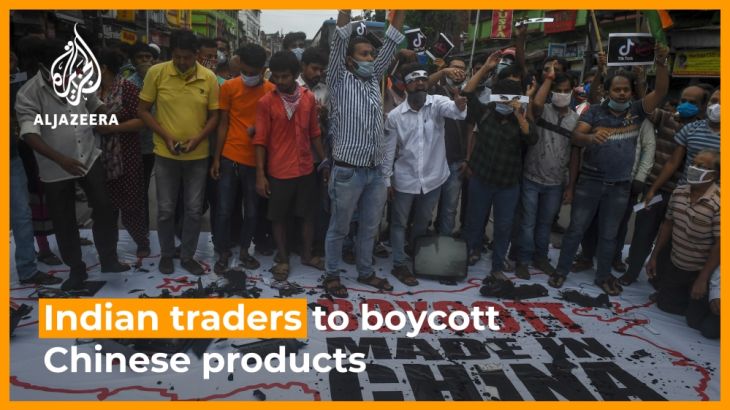
Indian traders to boycott Chinese products
One of India’s biggest trading associations wants a boycott of Chinese products.
Twenty Indian soldiers were killed on June 15 during a Himalayan border clash with Chinese troops in the disputed Ladakh region, sparking angry protests across India calling for military and economic action.
People in the western Indian city of Ahmedabad hurled Chinese TV sets from their balconies, while traders in the capital, Delhi, protested by burning Chinese goods.
Keep reading
list of 4 itemsParallel economy: How Russia is defying the West’s boycott
US House approves aid package worth billions for Ukraine, Israel
Ecuador weighs security, international arbitration in latest referendum
A central minister called for a boycott of restaurants selling “Chinese food” – an Indianised version of Chinese cuisine that is extremely popular. An opposition leader was seen clambering atop an excavator to blacken a billboard of Chinese smartphone maker Oppo.
Footage of a group of eager protesters also went viral after they burned an effigy of North Korean leader Kim Jong Un – mistaking him for Chinese President Xi Jinping.
Bilateral trade between the countries, already down by 15 percent since the 2018 financial year, could take a further hit as India mulls extra tariffs and anti-dumping duties on Chinese imports.
However, experts warn that it is easier said than done to convert such boycott rhetoric into reality.
Some told Al Jazeera they could not make a living without selling Chinese products but were afraid of saying so on camera.
While calls to boycott China trend on Twitter in India, the latest model of Chinese smartphone OnePlus sold out online within minutes of its Indian launch.
China is India’s second-largest trading partner after the US. It also accounts for nearly 12 percent of India’s imports across sectors such as chemicals, automotive components, consumer electronics and pharmaceuticals. Imports from China were worth $70bn in 2019.
India’s booming smartphone sector also heavily depends on cheap Chinese phones made by Oppo, Xaomi and others with a sizeable share of the local market.
Most consumer electronics makers say they will be paralysed if they cannot import crucial intermediate goods from China.
This report was produced and edited by Al Jazeera NewsFeed’s Hassan Ghani.